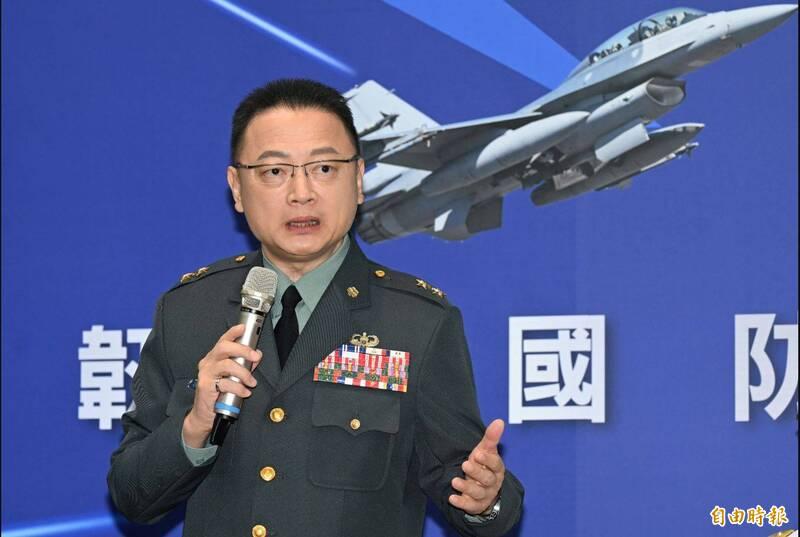China's muscle flexing at a recent military parade did not help to create a positive image, a Taiwanese military spokesperson said yesterday.
"We do not think that holding a grand display of military equipment to intimidate neighboring countries is a good way to build a positive image," Sun Li-fang (孫立方), who heads the Ministry of National Defense's Administration Office, told a press event held to highlight some of the military's weapons systems to be displayed at the Taipei Aerospace & Defense Technology Exhibition.
The exhibition opens today at Taipei Nangang Exhibition Center's Hall 1 and runs through Saturday.

Photo: Liao Chen-hui, Taipei Times
Sun was replying to a reporter's question about whether the Chiang Kung I air defense missile, which can reach an altitude of 70km and is one of the exhibition's highlights, could be used to intercept Chinese intercontinental ballistic missiles featured at the military parade.
China's parade was held on Sept. 3 at Tiananmen Square in Beijing to mark the 80th anniversary of the end of World War II.
The ministry attaches a high level of importance to the military equipment unveiled at the parade and has conducted in-depth research into its capabilities and the threats it poses to Taiwan, Sun said.
"However, we must stress that neither the exhibition nor our pavilion is meant to give the impression that we want to engage in an arms race with China," Sun said.
A display of weapons does not necessarily reflect China's capabilities, as they are "two completely different things," he said.
Lee Shih-chiang (李世強), president of the National Chung-Shan Institute of Science and Technology, which is responsible for the Chiang Kung (強弓, “Strong Bow”) program, said there are several types of air defense missiles and lower-cost weapons designed to intercept Chinese missiles and other incoming targets at different altitudes, and the Chiang Kung I is only one of them.

The manufacture of the remaining 28 M1A2T Abrams tanks Taiwan purchased from the US has recently been completed, and they are expected to be delivered within the next one to two months, a source said yesterday. The Ministry of National Defense is arranging cargo ships to transport the tanks to Taiwan as soon as possible, said the source, who is familiar with the matter. The estimated arrival time ranges from late this month to early next month, the source said. The 28 Abrams tanks make up the third and final batch of a total of 108 tanks, valued at about NT$40.5 billion

Two Taiwanese prosecutors were questioned by Chinese security personnel at their hotel during a trip to China’s Henan Province this month, the Mainland Affairs Council (MAC) said yesterday. The officers had personal information on the prosecutors, including “when they were assigned to their posts, their work locations and job titles,” MAC Deputy Minister and spokesman Liang Wen-chieh (梁文傑) said. On top of asking about their agencies and positions, the officers also questioned the prosecutors about the Cross-Strait Joint Crime-Fighting and Judicial Mutual Assistance Agreement, a pact that serves as the framework for Taiwan-China cooperation on combating crime and providing judicial assistance, Liang

A group from the Taiwanese Designers in Australia association yesterday represented Taiwan at the Midsumma Pride March in Melbourne. The march, held in the St. Kilda suburb, is the city’s largest LGBTQIA+ parade and the flagship event of the annual Midsumma Festival. It attracted more than 45,000 spectators who supported the 400 groups and 10,000 marchers that participated this year, the association said. Taiwanese Designers said they organized a team to march for Taiwan this year, joining politicians, government agencies, professionals and community organizations in showing support for LGBTQIA+ people and diverse communities. As the first country in Asia to legalize same-sex

MOTIVES QUESTIONED The PLA considers Xi’s policies toward Taiwan to be driven by personal considerations rather than military assessment, the Epoch Times reports Chinese President Xi Jinping’s (習近平) latest purge of the Chinese People’s Liberation Army (PLA) leadership might have been prompted by the military’s opposition to plans of invading Taiwan, the Epoch Times said. The Chinese military opposes waging war against Taiwan by a large consensus, putting it at odds with Xi’s vision, the Falun Gong-affiliated daily said in a report on Thursday, citing anonymous sources with insight into the PLA’s inner workings. The opposition is not the opinion of a few generals, but a widely shared view among the PLA cadre, the Epoch Times cited them as saying. “Chinese forces know full well that